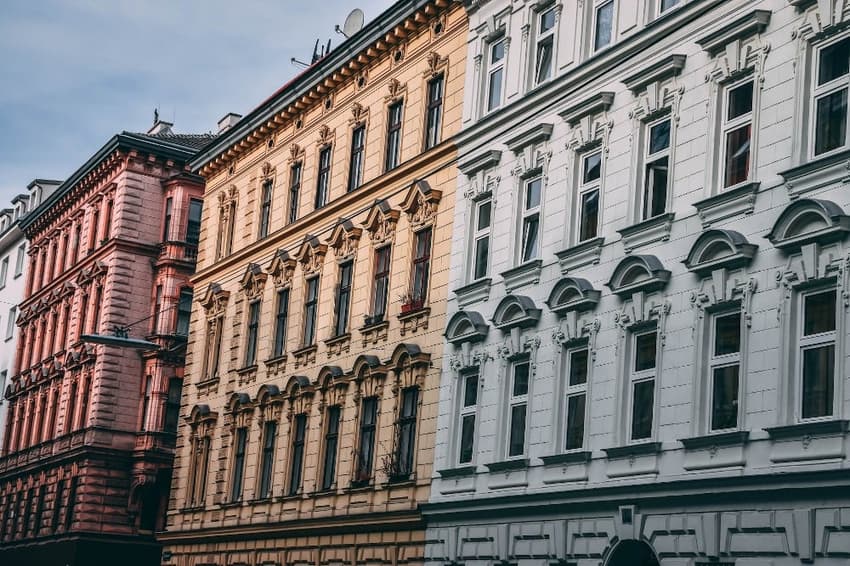How much does it cost to buy an apartment in Austria?

Buying an apartment in Austria is sadly becoming an impossible dream for many people amid strict guidelines, rocketing loan costs and property price increases outpacing income rises.
According to cost comparison platform, Durchblicker, an average two-income household taking out a Wohnkredit (a home loan) this year will have to pay almost 70 percent of its monthly disposable income to pay off the debt, essentially making borrowing impossible.
"No bank would finance a debt ratio of this magnitude," said Durchblicker property expert Andreas Ederer, according to daily Kronen Zeitung.
READ ALSO: ‘Concrete gold’: Austria ranks as Europe’s second most expensive property market
If we take a 90-square-metre condominium in the third district of Vienna as an example, the proportion of household income needed to repay the debt used to be much lower.
For the past 25 years, a two-income household has typically had to pay around 40 percent of its household income towards repaying that debt.
READ ALSO: EXPLAINED: Why people have stopped buying property in Austria
Let's break down the example for 2023: if the new-build apartment costs €754,067, credit costs over a 30-year term (5 percent variable rate, 30 percent equity) would total €3,427 a month.
The average monthly income of a two-income household comes in at €4,958 now, putting the debt repayment quota for this property at 69 percent.
A sharp increase in the cost of loans has sent debt repayment quotas soaring, making home ownership unaffordable for many.
To turn things around, Ederer says that more new buildings are needed, especially cooperative apartments with an option to buy.
READ ALSO: Where to find property in Austria for under €100k
And because property prices have risen much more sharply than income over the past decades, he's also calling for collective bargaining wage agreements to be higher.
Finally, Austria's strict lending guidelines, which stipulate a maximum debt of 40 percent of household income, should also be relaxed.
Mortgage repayments cannot exceed 40 percent of a household's net salary, making it much harder for people on lower or middle incomes to be accepted for credit.
And since August 2022, would-be buyers in Austria have been required to stump up at least 20 percent of a property's purchase price as a deposit.
READ ALSO: EXPLAINED: How Austria's new property buying rules could impact you
Comments
See Also
According to cost comparison platform, Durchblicker, an average two-income household taking out a Wohnkredit (a home loan) this year will have to pay almost 70 percent of its monthly disposable income to pay off the debt, essentially making borrowing impossible.
"No bank would finance a debt ratio of this magnitude," said Durchblicker property expert Andreas Ederer, according to daily Kronen Zeitung.
READ ALSO: ‘Concrete gold’: Austria ranks as Europe’s second most expensive property market
If we take a 90-square-metre condominium in the third district of Vienna as an example, the proportion of household income needed to repay the debt used to be much lower.
For the past 25 years, a two-income household has typically had to pay around 40 percent of its household income towards repaying that debt.
READ ALSO: EXPLAINED: Why people have stopped buying property in Austria
Let's break down the example for 2023: if the new-build apartment costs €754,067, credit costs over a 30-year term (5 percent variable rate, 30 percent equity) would total €3,427 a month.
The average monthly income of a two-income household comes in at €4,958 now, putting the debt repayment quota for this property at 69 percent.
A sharp increase in the cost of loans has sent debt repayment quotas soaring, making home ownership unaffordable for many.
To turn things around, Ederer says that more new buildings are needed, especially cooperative apartments with an option to buy.
READ ALSO: Where to find property in Austria for under €100k
And because property prices have risen much more sharply than income over the past decades, he's also calling for collective bargaining wage agreements to be higher.
Finally, Austria's strict lending guidelines, which stipulate a maximum debt of 40 percent of household income, should also be relaxed.
Mortgage repayments cannot exceed 40 percent of a household's net salary, making it much harder for people on lower or middle incomes to be accepted for credit.
And since August 2022, would-be buyers in Austria have been required to stump up at least 20 percent of a property's purchase price as a deposit.
READ ALSO: EXPLAINED: How Austria's new property buying rules could impact you
Join the conversation in our comments section below. Share your own views and experience and if you have a question or suggestion for our journalists then email us at [email protected].
Please keep comments civil, constructive and on topic – and make sure to read our terms of use before getting involved.
Please log in here to leave a comment.